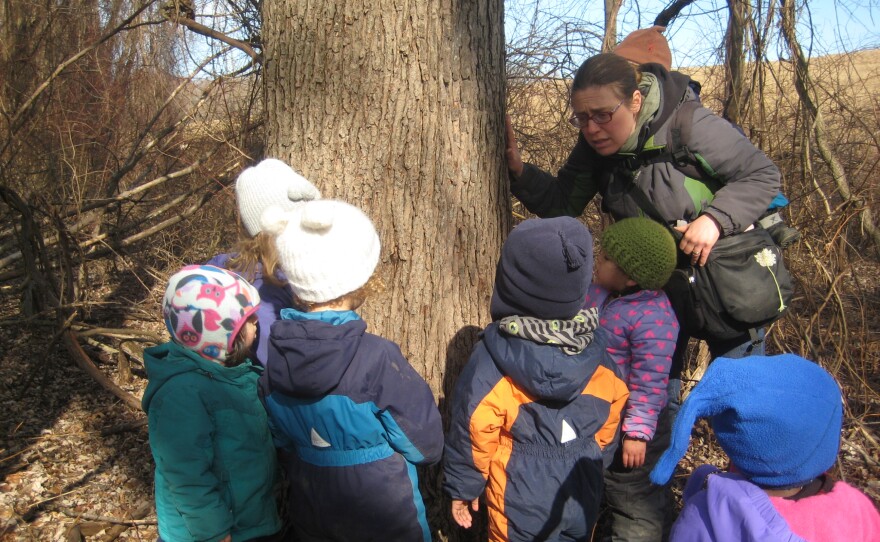Starting Monday, child care centers in Massachusetts can apply to reopen as part of the governor's Phase Two plan. But they will have to meet the state's new safety requirements against COVID-19.
Many child care providers and parents say those rules are unrealistic and potentially harmful for the emotional and developmental health of children.
Tina Sullivan is among the critics. Since March, she has been working her job for the city of Springfield mostly from home, with a 15-month-old son underfoot.
She and her husband have tag-teamed the childcare, but "it is very difficult to manage working from home full time with a toddler," Sullivan said.
So she's eager to send her son back to their family daycare in Springfield. But when she read the state's 32 pages of new rules for child care centers, her heart sank.
"Some of them seem to go contrary to everything that we know about young childhood, social and emotional development," she said.
For example, children should play six feet apart from each other — inside and outside — and if they can't, teachers must encourage most kids over 2 to wear masks.
"Anyone who has spent any time around a child under five knows that if you put anything on their face or their head, their immediate instinct is to pull it off and grab at it and play at it," Sullivan said.
Teachers themselves should try to avoid hugging or touching children. They're also supposed to wear masks in the classroom, which is the part that bothers Sullivan the most.
"Not being able to watch adult speech and also be able to see their facial expressions — that's a huge part of how they learn and develop at that age," she said. "I feel like that's sort of going to add to the emotional trauma of having already been separated from people for three months."
Samantha Aigner-Treworgy, the Massachusetts commissioner for early education and care, said the new requirements were developed with the help of public health professionals, and she's confident child care providers will come up with the right activities, toys and room set-up.
"This is uncharted territory for everyone," Aigner-Treworgy said. "We're not trying to punish children for being children. We are relying on our child development experts in the field to really think about how they design their days to encourage social distancing, and also have the growth and learning and fun that children need to to enjoy their day."
But those experts are not so sure. In fact, many of them are livid.
Child care providers have taken to social media, including the early education department's Facebook page, to protest the new rules, which also include continuously screening children for symptoms and extra disinfecting throughout the day.
To meet new mandated ratios, many child care centers will have to reduce the number of children and that means losing out on tuition money. They also must absorb the increased costs of extra cleaning.
As of June 11, more than 35,000 people have signed a petition asking the state to revise the requirements.
"I'm staying up late nights now thinking about how am I going to make this not frightening for young children," said Suzanne Stillinger, a teacher at Farm Hands Preschool in Northampton.
She's dreading not being able to physically soothe children at naptime or having to tell children to stay away from each other and not share toys.
"[For] inside, the guidelines are encouraging us to create individual play spaces for children, which feel a little bit like stalls, you know, like horse stalls," she said. "That's not how most children prefer to play. And their work is play. That's how they're making sense of the world and what their place is in it."
Some providers have posed this question: If it's not safe enough to open with lesser precautions, then isn't it just too soon to reopen, period?
"We are rushing into this because people need to get back to work because there's been a failure at the state and federal level to support working families during a global pandemic," said Stillinger. "And who's going to be asked to pay the price for that?"
But Aigner-Treworgy said her department is moving according to CDC guidelines and the governor's reopening plan. She said she'll reevaluate every two months.
And while she's confident the plan makes sense, she said "no provider is going to be forced to reopen."
Aigner-Treworgy does acknowledge, however, that any child care center that wants to keep getting state subsidies for low-income families will, in fact, have to open now.
Farm Hands Preschool director Alya Stoffer-Koloszyc is still weighing whether she can reopen on the state's timeline, but she thinks families will expect her to.
"It feels like there's this kind of urgency now," Stoffer-Koloszyc said. "And the biggest frustration is that we feel like that urgency and that responsibility is on our shoulders."
Parent Tina Sullivan said she'll soon be expected to work mostly from the office, so she'll probably have to send her son back to child care. But she’d rather the setting be nurturing and open — even if that means there’s more risk of getting the virus.
"At some point we have to start edging back towards some form of new normal," she said. "And I want it to have as little emotional and developmental harm to my child as possible."
After child care providers submit their plans for reopening, the Department of Early Education and Care says the turnaround for provisional approval will be quick.





